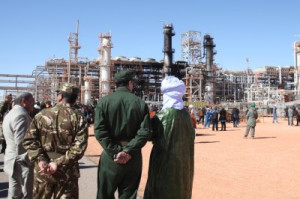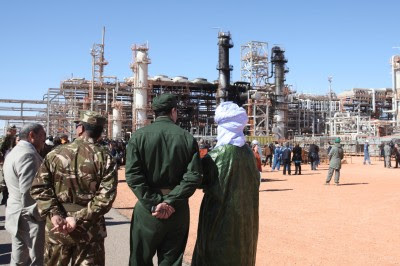The Washington Post
By Missy Ryan

In this file photo, Algerian soldiers and officials stand in front of the In Amenas gas plant that former Algerian soldier Mokhtar Belmokhtar’s militants assaulted in 2013. (Associated Press)
The U.S. military launched an airstrike in Libya targeting Mokhtar Belmokhtar, the one-eyed al-Qaeda veteran believed to be the mastermind of a 2013 hostage attack on an international energy plant in Algeria, Libyan and U.S. officials said Sunday.
Col. Ed Thomas, a spokesman for Gen. Martin Dempsey, the chairman of the Joint Chiefs of Staff, said U.S. aircraft had conducted the strike against Belmokhtar on Saturday night. He said officials are assessing the results of the operation.
“Belmokhtar has a long history of leading terrorist activities as a member of AQIM, is the operational leader of the al Qaeda-associated al Murabitun organization in northwest Africa, and maintains his personal allegiance to al Qaeda,” Thomas said in a statement, referring to al-Qaeda in the Islamic Maghreb.
It’s not clear whether Belmokhtar was killed in the attack.
The internationally recognized Libyan government, one of two competing national authorities claiming legitimacy in the conflict-wracked country, said the U.S. planes had killed not just Belmokhtar but also a number of other militants in eastern Libya.
“The Libyan government confirms that this operation is a piece of the international support that it has long requested to fight terrorism,” it said in a statement.
A former Algerian soldier, Belmokhtar was a senior member of AQIM, al-Qaeda’s branch in North Africa, before founding his own militant offshoot, the Signed in Blood Battalion, in 2012. In 2013, U.S. officials say, his militants launched an ambitious assault on the In Amenas energy complex in eastern Algeria. After Algerian troops ended the four-day siege, at least 37 hostages were dead, including three Americans.
Belmokhtar also is believed to have fought in Afghanistan in the 1990s.
After that attack, he was charged in a New York court in connection with the siege in Algeria and a host of other militant activities. The U.S. government also had offered a $5 million rewardfor information on his whereabouts.
The strike marks the first American counterterrorism operation in Libya since last June, when U.S. commandos descended on Benghazi, where they captured Ahmed Abu Khattala, a suspect in the 2012 attacks that killed J. Christopher Stevens, the U.S. ambassador to Libya, and three other Americans in that city.
In 2013, U.S. forces captured Abu Anas al-Libi, another militant linked to al-Qaeda, in Libya. He died at a New York hospital earlier this year.
But U.S. military operations have been limited in Libya since the war that ousted former leader Moammar Gaddafi in 2011.
After the Obama administration pulled its remaining personnel out of Libya last summer, shuttering its embassy in the face of mounting violence, U.S. diplomatic activity has been focused on behind-the-scenes efforts to foster a political deal in U.N.-brokered peace talks.
Those talks, led by Spanish diplomat Bernadino Leon, may be reaching a critical juncture, which U.S. officials hope will clear the way for the formation of a national unity government that could address the country’s security problems.
But it’s far from clear that the Western-backed government in the eastern city of Tobruk and the Islamist-led government in Tripoli can reach a lasting deal. At the same time, a variety of militias and Islamist groups continue to clash across Libya. In recent months, the Islamic State has emerged as a powerful new militant player.
Alistair Baskey, a White House spokesman, said Belmokhtar was “not party to the current conflict in Libya.”
“The United States remains deeply concerned about the growing presence in Libya of terrorists which threatens Libyans themselves most immediately and highlights the urgent need for a political resolution to the ongoing conflict there,” he said.
Adam Goldman contributed to this report.
Missy Ryan writes about the Pentagon, military issues, and national security for The Washington Post.







